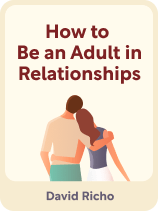

This article is an excerpt from the Shortform book guide to "How to Be an Adult in Relationships" by David Richo. Shortform has the world's best summaries and analyses of books you should be reading.
Like this article? Sign up for a free trial here.
What’s the Buddhist concept of mindfulness? What does it mean to love mindfully?
Mindfulness means being in the present without trying to influence or change it. The concept can be applied to your relationships as mindful love, the act of seeing your partner and yourself together as you currently are without judgments.
Below we’ll look at the benefits of mindful love and how to practice it, as described in David Richo’s book How to Be an Adult in Relationships.
What It Means to Love Mindfully
Richo’s relationship advice is rooted in the Buddhist concept of mindfulness, the practice of witnessing the present without evaluating, judging, or trying to influence it. When you’re mindful, you simply notice what you’re actually experiencing right now.
He argues that the key to a healthy relationship is a mindful approach. Specifically, he suggests adopting mindful love: the practice of seeing your partner, yourself, and your relationship as each really is in the present, without imposing your interpretations.
(Shortform note: Mindfulness is often associated with meditation, but it encompasses much more than that. You can think of meditation as training: Buddhists believe that it gradually teaches them to live in the present moment. This process gives them the insight they’ll need to understand suffering, let go of their ego, and reach enlightenment. Western psychologists traditionally think of mindfulness as a general stress-management tool. Mindful loving is a stress-management tool for relationships: Part of its benefit is that you’re just more relaxed in your relationship. As a result, you have healthier conflict and less of it.)
3 Benefits of Mindful Love
Richo says that practicing mindfulness benefits you in three ways: It encourages you to face reality, enables you to be emotionally resilient, and facilitates compassion. When you love mindfully, these benefits can support your relationships, too. Let’s explore each.
Benefit #1: Mindfulness Encourages You to Face Reality
Richo argues that mindfulness enables you to accept reality by keeping you tethered to the present. Instead of allowing your mind to come up with interpretations of events that may or may not be accurate, mindfulness requires you to focus on the verifiable facts of a situation—what you’re actually experiencing.
Benefit #2: Mindfulness Enables You to Be Emotionally Resilient
Richo also explains that mindfulness teaches you that you’re strong enough to handle all of your feelings, perceptions, and experiences, no matter how uncomfortable they may be.
(Shortform note: Psychologists explain that mindfulness increases your emotional resilience by teaching you how to tolerate discomfort. As you pay attention to reality from moment to moment, you may have some negative feelings—maybe you’re feeling anxious because you had a bad day or you have some lingering pain from an old injury. There may be little you can do to stop those sensations right now, but at least you can wholeheartedly accept them as part of your present reality. When you let yourself fully experience uncomfortable emotions, you stop resisting those emotions, which makes accepting, processing, and moving on from them easier.)
Benefit #3: Mindfulness Facilitates Compassionate Validation
Richo explains that mindfulness encourages you to assume a compassionate view of reality—when you see things as they really are, you’ll discover two things:
- Every living being is irrevocably divine, fundamentally good, and capable of both loving and being loved.
- The universe itself is compassionate since it generously provides you (and all other forms of life) with everything you need to survive—and often even more than that.
When you adopt the view that all life has inherent lovability, you’ll be able to feel compassion for others—even if you disagree with them, are upset with them, or simply can’t relate to them.
(Shortform note: Many spiritual and secular philosophies generally follow tenets similar to those of inherent lovability and a compassionate universe. For example, according to the Law of Attraction, positive energy flows from the universe into your life when you think positively. In short, these tenets reflect the basic idea that when you believe that the universe is compassionate and has good things in store for you, you mirror that compassion in your life and relationships.)
How to Practice Mindful Love: Be GREAT to Your Loved Ones
Richo says that mindful love has five key aspects that can be applied in all kinds of relationships: attention, acceptance, appreciation, affection, and allowing. We’ll call this the GREAT model—Gratitude, Respect, Engagement, Affirmation, and Tenderness—to help you remember that these practices are key to a great relationship.
Let’s look at each of these practices in further detail:
Gratitude
When you show gratitude for your loved one, you make them feel that they’re valuable, you like them, and you’re glad they exist. For example, if you appreciate that your child is kind, you might tell them that you feel lucky to know such a kind person. Richo says that gratitude is an important aspect of loving relationships because it helps the recipient feel worthy of being loved.
Respect
When you show respect for someone, you support their intrinsic right to live freely rather than trying to exert control over them. For example, if your partner adheres to a different faith than you do, you respect their religious practice, even if you disagree with the principles of their religion. Richo argues that respect is important because it encourages your loved one to show up in the relationship as their true self.
Engagement
When you engage with someone, you show sincere interest in them. For example, you might engage with your friend by listening to them talk about something they’re excited about. Richo says that engagement is important because it helps your loved one feel like they matter to you.
Affirmation
When you affirm someone, you let them know that you welcome their true nature: their strengths, weaknesses, flaws, and talents. For example, you might affirm your partner by telling them they’re a great cook if they make you a delicious dinner. According to Richo, one reason affirmation is important is that it makes your loved one feel that you understand who they really are.
Tenderness
When you show someone tenderness, you display feelings of devotion and care for them. For example, you might show your partner tenderness by making a point to tell them you love them every day. Richo explains that tenderness supports healthy relationships by making both physical and emotional intimacy possible.

———End of Preview———
Like what you just read? Read the rest of the world's best book summary and analysis of David Richo's "How to Be an Adult in Relationships" at Shortform.
Here's what you'll find in our full How to Be an Adult in Relationships summary:
- The secret to a long-lasting, loving relationship
- How to overcome emotional wounds that hold you back from loving
- How the Buddhist concept of mindful loving can create a better world






